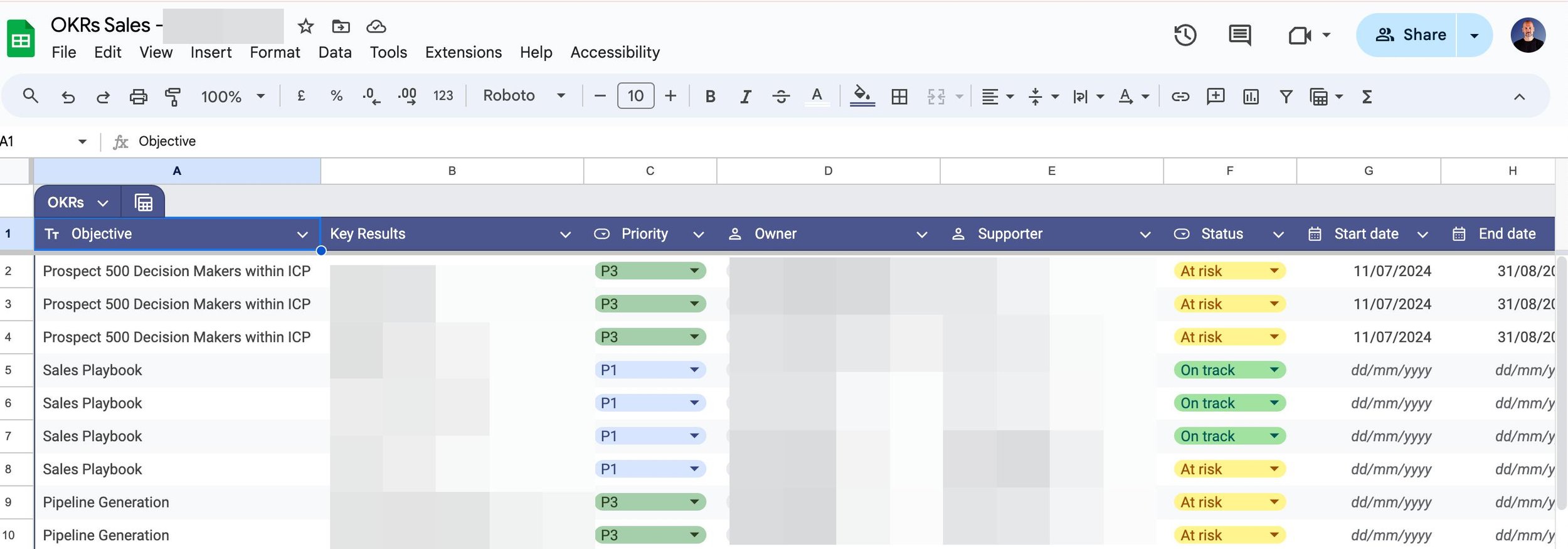Introducing Sales OKR's
Hey Friends,
Every week, I talk to 3 to 4 founders, and they all have financial goals to achieve.
Some go a step further and take their financials and break them down into monthly or quarterly targets.
That's great!
But how do you reach those goals?
What actions and projects are you going to undertake to get there?
You might think, "Well, that's the sales team's job!"
However, selling today is very challenging, potentially even more so than building a successful" helpful that's.
Commercialisation is complex; even the best product can fail if positioned poorly.
Everyone in the company must understand the sales process and contribute where possible.
That's why I strongly believe we should have OKRs for the sales team.
I did this as a full-time VP of Sales, and I do it now as a fractional sales.
Introducing Sales OKRs
Disclaimer: I'm not an expert in OKRs, and I don't aim to be.
My goal is not to perfect the framework but to guide sales teams and highlight our success in meeting our objectives.
Sales OKRs help bridge the gap between high-level goals and the day-to-day actions needed to achieve them.
How to Set Your First Sales OKRs
I usually sit down with the founder and brainstorm 3 to 4 key objectives within a specific timeframe.
These objectives should be clear, measurable, and achievable.
Then, we identify the Key Results (KRs) to track those objectives. These KRs are the specific, quantifiable outcomes that indicate progress towards the objective.
Example of Sales OKRs
Objective: Write and publish our first sales playbook on Notion.
- Key Result 1: Build a practical template for version 1 with 10 pages to complete.
- Key Result 2: Write 3 pages daily and share with the team.
- Key Result 3: Record 5 calls per day and add them to the playbook.
The objective here is clear and actionable, and the key results provide specific steps to achieve it. The team can make steady progress and track their achievements by breaking down the objective into smaller, manageable tasks.
Example of Sales OKRs
Sharing and Transparency
It's crucial to make these OKRs available to everyone.
Use platforms like Notion or Google Docs to ensure transparency.
Your sales team and the entire company should have access to these documents.
This transparency lets everyone understand what sales are doing to hit revenue goals, providing peace of mind and clear directions to your sales team.
Monitoring and Adjusting
Review your Sales OKRs regularly to monitor progress and make adjustments as needed.
This could be in the form of weekly check-ins or monthly reviews.
During these reviews, assess what's working and what's not.
Are there any obstacles preventing the team from achieving their key results?
Do the objectives need what's adjusted based on what's need to be adjusted based on new information or changing circumstances?
Benefits of Sales OKRs
Implementing Sales OKRs has several benefits:
They provide clarity and focus. By setting clear objectives and key results, the sales team knows exactly what they need to achieve and how to get there.
Sales OKRs boost accountability. When the team knows its progress is being tracked and reviewed, it will likely stay committed and motivated.
Sales OKRs align the sales team's efforts with the company's overall goals, ensuring everyone is working towards the same vision.
Now It's Your Turn
If you're unsure where to start, I have created a simple table on Google Sheets that you can use now.
Just copy it to your Gdrive, and you're good to go.
This tool will help you set and track your first Sales OKRs, providing a structured approach to achieving your sales.
Thanks for reading this far. See you all next week!

